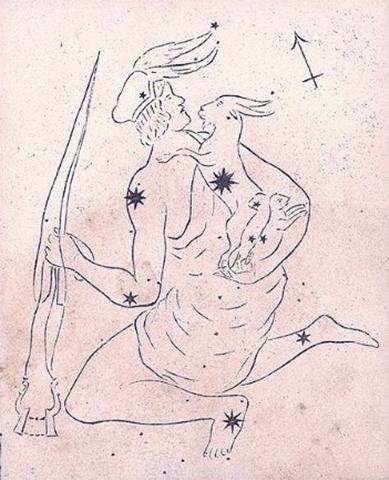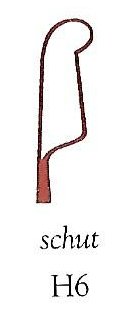127. Now we can understand why we should perceive a skeleton in front of the White Rabbit: .jpg) ... after a time she heard a little pattering of feet in the distance, and she hastily dried her eyes to see what was coming. It was the White Rabbit returning splendidly dressed, with a pair of white kid-gloves in one hand and a large fan in the other: he came trotting along in a great hurry, muttering to himself, as he came, 'Oh! The Duchess, the Duchess! Oh! Won't she be savage if I've I've kept her waiting!' "Alice felt so desperate that she was ready to ask help of any one: so, when the Rabbit came near her, she began, in a low, timid voice, 'If you please, Sir - ' The Rabbit started violently, dropped the white kid-gloves and the fan, and scurried away into the darkness as hard as he could go ..." The pair of white kid-gloves surely were alluding to the pair of hands of the White Goddess in the night sky.
The Charioteer had no Sun Horse, therefor the Moon (the White Goddess) must rule.
As to the large fan in the other hand of the White Rabbit, we can get help from the Swedish word corresponding to 'fan', viz. 'sol-fjäder' (literally: 'sun feather'). In order to keep a fire alive you should blow on it, preferrably by using a fan of bird feathers.
Puhi. 1. To blow; to light a fire; to extinguish, to blow out; he-puhi te umu, to light the fire for the earth oven. 2. To fish for lobsters at night using a bait (but during the day one calls it hî); puhiga, night fishing spot. Vanaga. To blow; puhi mai, to spring up; pupuhi, wind, fan, to blow, puffed up, to blow fresh, to ferment, to swell, to bloat, to spring out, to gush, yeast; pupuhi vai, syringe; pupuhi eve, squirt; pupuhi heenua, volley; pupuhi nunui, cannon; pupuhi nui, swivel gun; ahuahu pupuhi, amplitude; vai pupuhi, water which gushes forth; pupuhihia, to carry on the wind; hakapupuhi, to gush, leaven, volatilize; puhipuhi, to smoke, to smoke tobacco, a pipe. Churchill ... In other words, the ancient Druidic religion based on the oak-cult will be swept away by Christianity and the door - the god Llyr - will languish forgotten in the Castle of Arianrhod, the Corona Borealis. This helps us to understand the relationship at Rome of Janus and the White Goddess Cardea who is ... the Goddess of Hinges who came to Rome from Alba Longa. She was the hinge on which the year swung - the ancient Latin, not the Etruscan year - and her importance as such is recorded in the Latin adjective cardinalis - as we say in English 'of cardinal importance - which was also applied to the four main winds; for winds were considered as under the sole direction of the Great Goddess until Classical times ... ... When we survey the existing races of mankind from Greenland to Tierra del Fuego, or from Scotland to Singapore, we observe that they are distinguished one from the other by a great variety of religions, and that these distinctions are not, so to speak, merely coterminous with the broad distinctions of race, but descend into the minuter sub-divisions of states and commonwealths, nay, that they honeycomb the town, the village, and even the family, so that the surface all over the world is cracked and seamed, sapped and mined with rents and fissures and yawning crevasses opened up by the disintegrating influence of religious dissensions. Yet when we have penetrated through these differences, which affect mainly the intelligent and thoughtful part of the community, we shall find underlying them all a solid stratum of intellectual agreement among the dull, the weak, the ignorant, and the superstitious, who constitute, unfortunately, the vast majority of mankind. One of the great achievements of the nineteenth century was to run shafts down into this low mental stratum in many parts of the world, and thus to discover its substantial identity everywhere. It is beneath our feet - and not very far beneath them - here in Europe at the present day, and it crops up on the surface in the heart of the Australian wilderness and wherever the advent of a higher civilisation has not crushed it underground. This universal faith, this truly Catholic creed, is a belief in the efficacy of magic. While religious systems differ not only in different countries, but in the same country in different ages, the system of sympathetic magic remains everywhere and at all times substantially alike in its principles and practice ... ... Nut, whom the Greeks sometimes identified with Rhea, was goddess of the sky, but it was debatable if in historical times she was the object of a genuine cult. She was Geb's twin sister and, it was said, married him secretly and against the will of Ra. Angered, Ra had the couple brutally separated by Shu and afterwards decreed that Nut could not bear a child in any given month of any year. Thoth, Plutarch tells us, happily had pity on her. Playing draughts with the Moon, he won in the course of several games a seventy-second part of the Moon's light with which he composed five new days. As these five intercalated days did not belong to the official Egyptian calendar of three hundred and sixty days, Nut was thus able to give birth successively to five children: Osiris, Haroeris (Horus), Set, Isis and Nepthys ...
... Hercules first appears in legend as a pastoral sacred king and, perhaps because shepherds welcome the birth of twin lambs, is a twin himself. His characteristics and history can be deduced from a mass of legends, folk-customs and megalithic monuments. He is the rain-maker of his tribe and a sort of human thunder-storm. Legends connect him with Libya and the Atlas Mountains; he may well have originated thereabouts in Palaeolithic times. The priests of Egyptian Thebes, who called him Shu, dated his origin as 17,000 years before the reign of King Amasis ... In ancient Egypt the addition of a final -t indicated a change from male to female, e.g. Shu to Shut and Nu to Nut.
... when the letter 'aleph' was erased from the Golem's forehead, what was left was 'met' - dead. And so the Golem died ...
... The manner of his death can be reconstructed from a variety of legends, folk-customs and other religious survivals. At mid-summer, at the end of a half-year reign, Hercules is made drunk with mead and led into the middle of a circle of twelve stones arranged around an oak, in front of which stands an altar-stone; the oak has been lopped until it is T-shaped. He is bound to it with willow thongs in the 'five-fold bond' which joins wrists, neck, and ankles together, beaten by his comrades till he faints, then flayed, blinded, castrated, impaled with a mistletoe stake, and finally hacked into joints on the altar-stone ... The White Rabbit dropped his white kid-gloves and his large (sun feather) fan because they belonged in the world of the living above and he could never bring them down to the earth below. Pu. 1. To come forward to greet someone met on the road; to walk in front, to go in front: ka-pú a mu'a, let them go first. 2. Pú a mu'a, to intervene, to come to someone's rescue; he-pú-mai a mu'a, he-moaha, he came to my rescue and saved my life. 3. Ancient expression: ai ka-pú, ai ka-pú, tell us frankly what you think. 4. Hole, opening, orifice; well; circumference, rotundity; swirling water; pú-haga, vaginal orifice; pú-henua (also just henua), placenta. He pú henua nó te me'e aau, he-oti-á; ina-á me'e ma'u o te rima i-topa-ai koe, a placenta was all you had, it is a past thing now; you held nothing in your hands when you were born (stern words said to children to make them realize that they must not be demanding, since they were born naked and without possessions). 5. To dig out (tubers): he-pú i te uhi, to dig out yams. Vanaga. 1. A trumpet. P Mgv.: pu, a marine shell. Mq.: pu, conch shell. Ta.: pu, shell, trumpet. 2. A small opening, hole, mortise, stirrup, to pierce, to perforate, to prick; pu moo naa, hiding place; taheta pu, fountain, spring; hakapu, to dowel, to pierce, to perforate. PS Sa., Fu., Niuē: pu, a hole. Churchill. Mq.: Pu, source, origin. Ma.: pu, root, origin, foundation. Churchill.
|
||||||||||||||||





